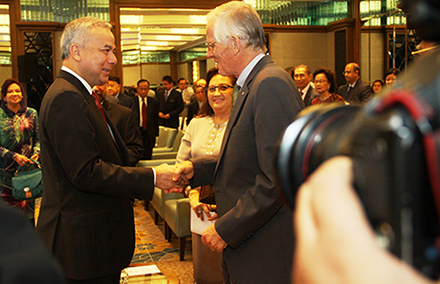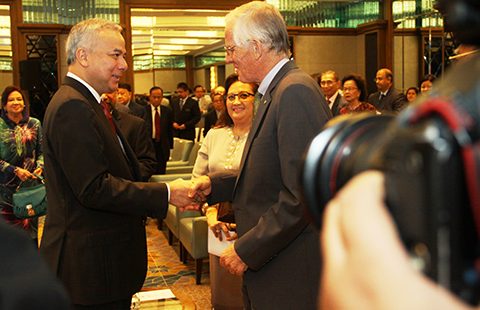
HRH Sultan Nazrin Muizzuddin Shah and Puan Sri Datuk Dr Suraiya Hani (daughter of the late Prime Minister, Tun Hussein Onn) with Professor Milner.
Tun Hussein Onn Chair discusses key domestic and international issues, and the importance of non-Western approaches to foreign relations.
Professor Tony Milner, who was Dean of Asian Studies at the Australian National University for 10 years, is currently on a two-year appointment in Malaysia as the Tun Hussein Onn Chair in International Studies at the Institute of Strategic International Studies (ISIS Malaysia).
The Chair is named after Malaysia’s third prime minister, and supported by the Noah Foundation (itself named after Hussein Onn’s prominent father-in-law, Mohamed Noah Omar).
The Noah Foundation also supports Chairs at prominent universities in England and the United States. Tony Milner is the first non-Malaysian to be appointed to the Tun Hussein Onn Chair, and earlier this year gave a public lecture on ‘Themes and Origins of Malaysian Foreign Policy’.
The lecture was held in the presence of the Ruler of Perak, Sultan Nazrin Shah, who is Royal Fellow at ISIS.
New Mandala spoke to Professor Milner about the chair, and the key issues in Malaysia’s domestic and international politics.
NM: What does your role as the Tun Hussein Onn Chair in International Studies entail? What is some of its history?
TM: I was honoured to take this position in Kuala Lumpur – and delighted that they gave it to an Australian. The Chair allows me to pursue my interests in both Malay history and regional relations.
I am trying to get a deeper understanding of the Malaysian approach to foreign relations, and that of other Southeast Asian governments as well. Malaysia has plenty of domestic political problems but is showing a good deal of creativity in its foreign policy. Australia may actually have something to learn from Malaysia in this area.
The international relations literature – for all its great strengths – is very much shaped by European history and traditions. Hedley Bull wrote long ago of the need to research non-Western approaches to foreign relations, but surprisingly little progress has been made.
It is a real advantage to be based in Malaysia at an institute that has played a critical role in the development of ASEAN as well as Malaysian foreign policy. Their annual Asia-Pacific Roundtable is a great event – it was really useful for me last year to be able to talk with the influential Chinese scholar, Yan Xuetong.
NM: What would you say to Western academics about spending significant periods of time in Asian institutions?
TM: I did my PhD in America and then – after spending a great year working with Clifford Geertz at the Institute for Advanced Study, Princeton – I decided to take every possible opportunity to spend time at institutions in the Asian region, particularly in Southeast Asia and Japan.
I think many more Australian academics should spend extended periods in Asian institutions. We have to learn more about how our colleagues in Asia approach history, anthropology, international relations … and so forth.
We need many more collaborative research projects. I’ve had a growing interest in regional relations – an interest stimulated when, in the 1990s, I ran a special project for the Academy of the Social Sciences on Australia-Asia relations, and when I later began to work closely with Asialink, and with Des Ball in CSCAP (Council for Security Relations in the Asia Pacific). A few years ago I cooperated with Yoneo Ishii and Moto Uchibori to develop an Japan-Australia Southeast Asian studies initiative.
It seems to me that there is urgency in the need to investigate Asian-region perceptions regarding foreign policy and strategic relations – urgency especially for Australians. Here I do not of course mean just academic perceptions.
There is much to be gained from working with US, European, Canadian colleagues – seeking to assess likely developments in the Asia Pacific. But Australians ought to give a priority to regional collaborations – in ASEAN, Northeast Asia and India.
NM: What do you think are the most pressing issues in Malaysia today?
TM: Malaysia faces tough challenges – it has been a seriously divided country since Independence in 1957, and has to deal with far more difficult issues than Australia has faced. It has also experienced enormous material change – anyone who knew the place 20 or 30 years ago is amazed by the development of the cities, the highway network, the size of the country’s exports, and so forth.
Some of the architecture is beautiful – and competes very strongly with Australia. The scale of the urban change, however, can be bewildering. If you had not visited Melbourne since 1970, I think you could still find your way around the city today. In the case of Kuala Lumpur this would be out of the question.
There is much to debate in the Malaysian political scene today – and ANU academics have played a healthy role – but we Australians ought also to keep in mind how strongly Malaysia’s problems are a consequence of British colonial policies. Malaysia’s Prime Minister has strong political skills – but he also faces damaging accusations and a campaign led by Dr Mahathir, the giant of Malaysian politics.
One big issue for Malaysia this year is the task of chairing ASEAN. They must deal with South China Sea issues, but in a way that does not divide ASEAN, and does not damage Malaysia’s strong and profitable relationship with China. Malaysia has displayed real diplomatic skill in the past, and will have to be especially effective this year.
NM: What do see as the future of Australia-Malaysia relations?
TM: Relations with Malaysia seem to me to be pretty good right now. Clearly Prime Minister Abbott gets on well with Prime Minister Najib – I’ve heard that from many quarters.
The way we cooperated in the search for MH370 was well received in Malaysia. We often do well in a crisis – remember former Prime Minister John Howard’s handling of the 2004 Indian Ocean tsunami!
It matters greatly that we are seen to be collaborative. We do not make a good impression when we try to lead the region. It may be unfair – because the proposal was well-intentioned – but Kevin Rudd’s Asia-Pacific Community initiative was damaging, and is remembered.
In contrast, the Australian government’s New Colombo Plan is sending the right message; that we have something to learn from the Asian region, not just something to contribute. In his own way, I think former Foreign Minister Bob Carr was making a similar point.
It is well known that Malaysia and Australia have had disagreements over the years – and they often arise when our vision for Asia (and the Asia Pacific) clashes with visions influential in Malaysia. It is untrue that only Prime Minister Mahathir resisted Australia.
It is also wrong to suggest that the occasional tensions mean our relationship with Malaysia is not close. In trade, education exchange, security relations, people-to-people links, we are very much entangled with Malaysia.
The Malaysians have also been helpful to us diplomatically, if one reads back through the many-decades-long narrative of Australia-Asia relations.
It was under Malaysia’s leadership, for instance, that we joined the East Asia Summit in 2005. At the Track 2 level it was the ISIS Malaysia which initiated the annual ASEAN-Australia-New Zealand Dialogue; a meeting that has been supported by our government and involves close cooperation between ANU and Asialink.
ISIS Malaysia also hosts the secretariat for CSCAP.
Tony Milner is Emeritus Professor, School of Culture, History & Language, ANU; Professorial Fellow, University of Melbourne; and current Tun Hussein Onn Chair in International Studies at the Institute of Strategic International Studies (ISIS Malaysia).
 Facebook
Facebook  Twitter
Twitter  Soundcloud
Soundcloud  Youtube
Youtube  Rss
Rss 